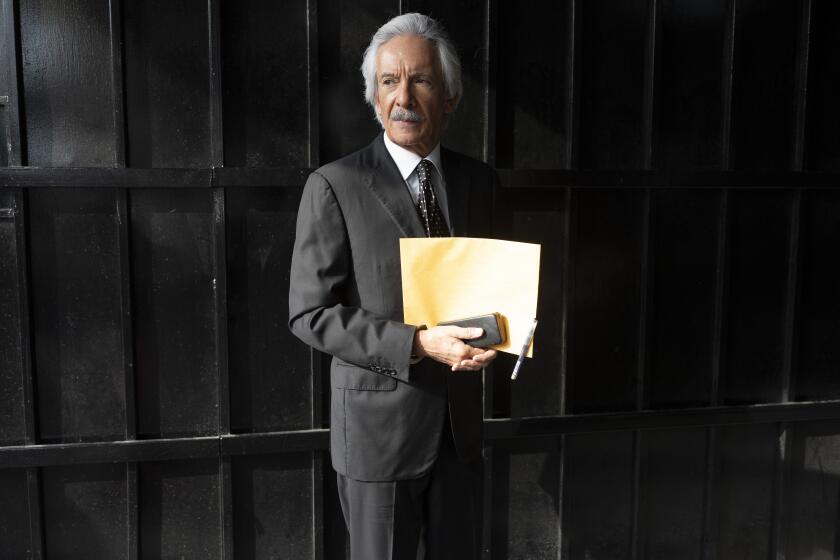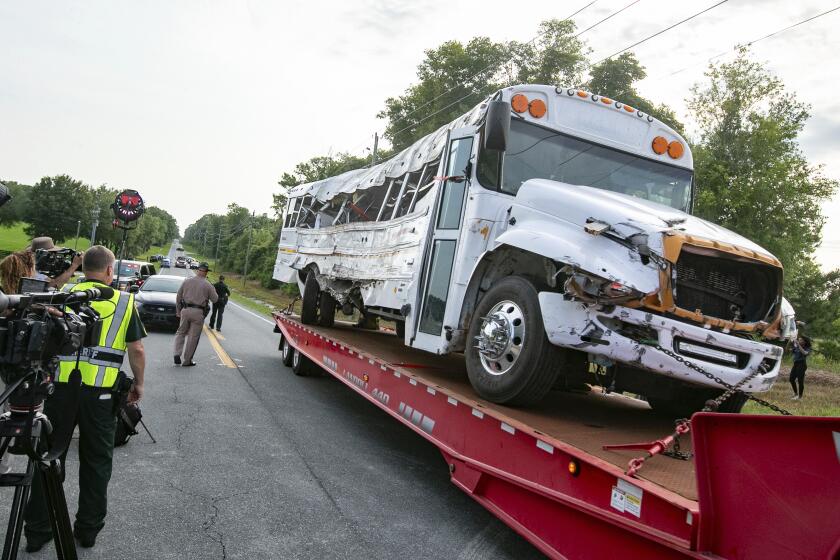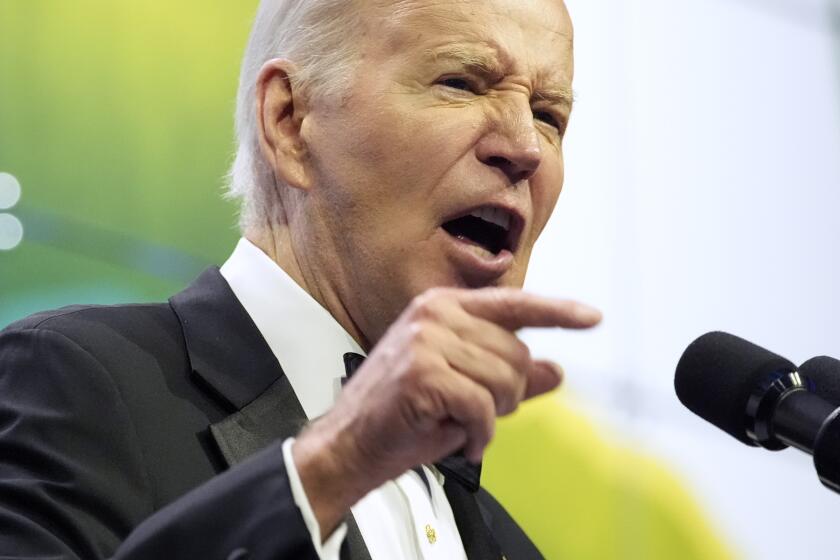Reagan Vetoes Bill for Farm Loan Aid : Hopes Credibility Will Outweigh Political Damage
In vetoing the farm-aid bill Wednesday, President Reagan gambled that any political damage to him and the Republican Party will be outweighed by the credibility his uncompromising stand will give him in pressing Congress for other politically sensitive budget cuts.
But Republicans and Democrats alike warn that the backlash, both in Congress and with the public, could prove far worse than the President has calculated.
Even at the White House, some sources say, there is belated recognition that the Administration did not focus on the issue early enough, then treated it solely as a budget matter rather than as a political issue and underestimated the severity of the farmers’ plight and its ripple effect on the farm economy.
Lack of attention to political problems during the protracted shake-up in the President’s staff, in which Reagan’s most trusted aides left the White House, was given as a major reason that aides misjudged the matter.
‘Not in Bad Shape’
Reagan’s opposition to the farm-aid bill was based in part on the belief that the number of financially strapped farmers is relatively small, White House Chief of Staff Donald T. Regan said. In an interview, Regan said that most farmers are “not in bad shape”--just “pockets of farmers in a few Midwest states.”
Former Democratic Chairman John White said that Regan “should be ashamed for making that kind of statement. The truth is that American agriculture from sea to shining sea is in deep, deep trouble. Livestock industry prices are cheaper than in pre-inflation days. I know, because I’m in the livestock business.”
Surveys have shown not only that farmers are in dire financial straits throughout the Midwest but that the situation has had a devastating ripple effect on the agriculture economy in general. Banks, farm machinery and small businesses all have suffered.
The U.S. comptroller of the currency has issued a report that agricultural banks with serious problems are concentrated in 11 Midwestern states. And, in Iowa alone, United Auto Workers members have lost 9,000 farm machinery jobs.
Some political analysts believe that Reagan has given the Democrats, who had the help of some farm-state Republicans in pushing the farm-aid bill through Congress, a no-lose situation.
Economic Trouble Seen
Norman Ornstein, a congressional specialist with the American Enterprise Institute, a Washington-based think tank, said that, although the extent of Democratic gains and Republican losses in the 1986 Senate and House elections in agriculture states will depend on the state of the farm economy then, farmers will almost surely still be in economic trouble--regardless of the state of the rest of the economy.
“You can be sure that if we go into the 1986 elections and farmers believe the Republican Party has turned its back on them, they will vote accordingly,” he said. Some Republicans who voted for the farm-aid bill will try to separate themselves from the President’s veto, Ornstein said, “but, if you’re a farmer and you’ve been hurt, you’re not going to be so discriminating.”
The issue could be especially troublesome for Republican senators seeking reelection in farm states, including Majority Leader Robert J. Dole of Kansas, James Abdnor of South Dakota, Mark Andrews of North Dakota, Steven D. Symms of Idaho, Dan Quayle of Indiana, Charles E. Grassley of Iowa, Mack Mattingly of Georgia, Don Nickles of Oklahoma and John P. East of North Carolina.
Most Relatively Immune
Most of these incumbents have been considered relatively immune to Democratic challenges, but the farm issue could change that. Of these farm-state senators, Abdnor, Andrews and Grassley voted with the Democrats for the farm-aid bill.
Some of Reagan’s political advisers say they believe that any political damage from the veto may be short-lived.
“A lot of Midwest members think the damage is significant,” a presidential adviser who asked not to be identified conceded. “But we’re betting that . . . the veto message of holding the line on spending will have a decent effect in persuading Congress to pass other deficit-reduction measures. And, hopefully, that will result in lower interest rates and the economy will look better for farmers in 1986.”
Issue Could Backfire
However, if the farm economy does not significantly improve, some observers believe that the issue could backfire against Republicans the way President Dwight D. Eisenhower’s farm policies boomeranged in the 1958 elections.
In 1957, Ornstein pointed out, Ezra Taft Benson, Eisenhower’s agriculture secretary, spearheaded a drive to overhaul federal farm price supports. When Democrats pushed measures through Congress opposing the changes, Eisenhower vetoed the legislation.
Democrats used the issue as a rallying cry in the 1958 elections. And, even though the farm economy had recovered by Election Day--the rest of the economy remained in a deep recession--farm-state losses contributed to the loss of 47 Republican House seats that year.
‘Finishing the Process’
“Ezra Taft Benson started the (Democratic) Party in Iowa in 1958, and John Block (Reagan’s agriculture secretary) is finishing the process,” Sen. Tom Harkin (D-Iowa) said. “We hardly existed as a party prior to 1958. Now, we control the Legislature and half of the statewide offices. We may become the dominant party next year.”
The Republican Party, Harkin said, “will pay a very dear price at the polls next year. They say hell hath no fury like a woman scorned. Hell hath no fury like a farmer double-crossed. Farmers were told last September that the Administration would put up $650 million for debt restructuring, that the President would not let farmers down. Since that time, only slightly over $3 million has been used for 35 loans nationwide.”
In 1984, Iowa farmers supported Reagan, 2 to 1. A statewide poll of 800 farmers published by the Des Moines Register-Tribune this week showed Reagan with a 49%-42% negative rating.
More to Read
Start your day right
Sign up for Essential California for news, features and recommendations from the L.A. Times and beyond in your inbox six days a week.
You may occasionally receive promotional content from the Los Angeles Times.






